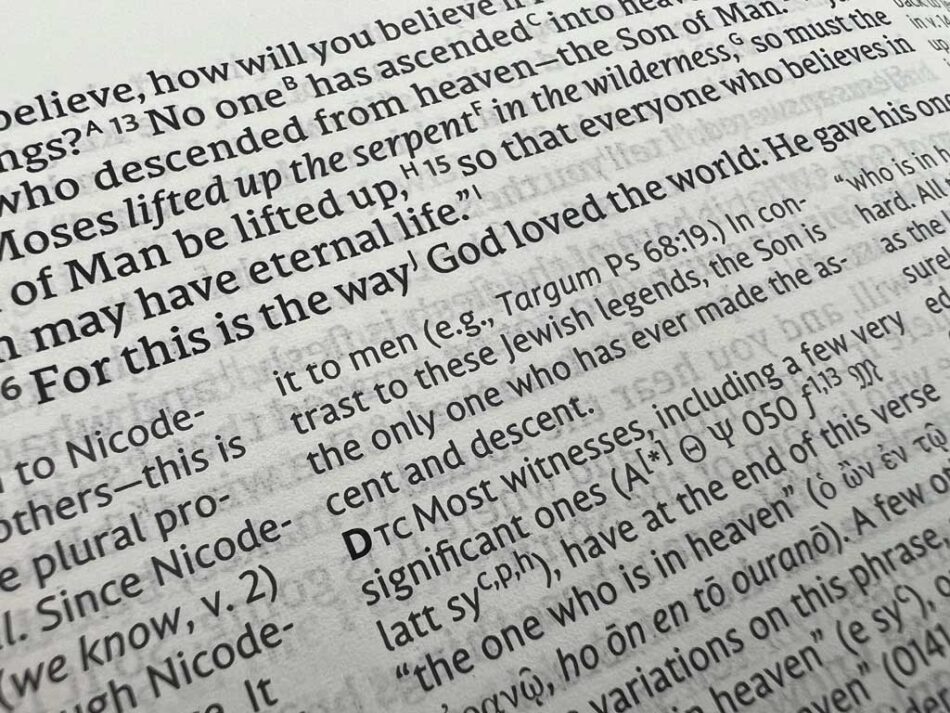John 3:16 is arguably the most famous, most cited, and most quoted verse in the entire Bible. And for good reason: it is good news! It is one of Scripture’s most beautiful pictures of the gospel. It is also one of the verses we struggle to understand well.
Small (but significant) differences
Depending on your translation, John 3:16 is going to read a little differently. For example, here it is in the New King James Version (NKJV):
“For God so loved the world that He gave His only begotten Son, that whoever believes in Him should not perish but have everlasting life.”
This is probably the wording you’re most familiar with. It’s how you’ll see it in the KJV, ESV, NIV, NASB, and many others. But that’s only one way of reading it. Try it in the New English Translation (NET):
“For this is the way God loved the world: He gave his one and only Son, so that everyone who believes in him will not perish but have eternal life.”
The differences in rendering seem small, but they are really important. And reading them together is helpful because the differences help us to better understand what Jesus is saying in this passage.
Does “so” mean what we think?
The difference in the rendering here is important because it helps us see the facets of what we’re reading. As modern English speakers, we are most likely to read “For God so loved the world,” in terms of the intensity of His affection.
And there is a degree to which we’re certainly right to do so. Think about the kind of love that God has for people like you and me. To literally send His Son—His one and only, only begotten, eternally existent Son. To be the substitute that we so desperately need both in faithfully living in the way we cannot, and in taking the condemnation that is ours by nature.
That is incredible love.
It’s the kind of love that goes beyond anything a “good man or woman” might offer (Rom. 5:7). Jesus laid His life down for His friends (John 15:13), but not while we were His friends—while we were yet His enemies. While we were helpless and hopeless, Christ died for us!
It’s hard to imagine a greater degree of affection.
But does that mean that the “so” of this verse is referring to the intensity of God’s love? Should we read it as though it’s intending to say that God loves the world so much?
I don’t think so. At least, not entirely.
The deeper truth we might miss
When I was preparing to teach this passage at my church, I spent some time digging into this aspect of the passage. I especially wanted to understand why the NET deviates from the traditional rendering.
Now, I have a confession: I do not have formal training in the original languages of the Bible. So, when I need to explore Greek or Hebrew, I turn to other resources. And one of the most helpful in my library is my NET Full Notes Edition Bible. This Bible includes all the translation notes explaining every decision the team made and helps explain why other translations might differ from one another.
And as I read the notes for this passage, it became clear why there is this difference between translations that fall (broadly) into more of a King James tradition like the NJKV and ESV, and others like the NET and CSB. The difference falls on the rendering of one word, “houtos.” This is the word the NKJV translates as “so,” which would naturally lead us back to that idea of the intensity of God’s affection.
But as I got deeper into the notes, I found that this isn’t entirely what John had in mind. Instead, he was telling his readers—and us—something much more profound.
Here’s what the note on John 3:16 says:
“The Greek adverb οὕτως (houtōs) can refer (1) to the degree to which God loved the world, that is, to such an extent or so much that he gave his own Son (see R. E. Brown, John [AB], 1:133-34; D. A. Carson, John, 204) or (2) simply to the manner in which God loved the world, i.e., by sending his own son (see R. H. Gundry and R. W. Howell, “The Sense and Syntax of John 3:14-17 with Special Reference to the Use of Οὕτως…ὥστε in John 3:16, ” NovT 41 [1999]: 24-39).
“Though the term more frequently refers to the manner in which something is done (see BDAG 741-42 s.v. οὕτω/οὕτως), the following clause involving ὥστε (hōste) plus the indicative (which stresses actual, but [usually] unexpected result) emphasizes the greatness of the gift God has given. With this in mind, then, it is likely (3) that John is emphasizing both the degree to which God loved the world as well as the manner in which He chose to express that love. This is in keeping with John’s style of using double entendre or double meaning. Thus, the focus of the Greek construction here is on the nature of God’s love, addressing its mode, intensity, and extent.”
The mode, intensity, and extent of God’s love in the gospel
While that note is a bit on the technical side (which makes sense), it’s the last section that helps us see what is actually going on and why the NET uses “in this way” instead of “so:”
“The focus of the Greek construction here is on the nature of God’s love, addressing its mode, intensity, and extent” (emphasis added).
John 3:16 isn’t just describing the intensity of God’s love, although it does that. It is also showing the mode and extent of that intense love. That God doesn’t love the world in a vague or generic way. God loves the world in a particular way that can be clearly seen. How?
By sending His one and only Son so that everyone who believes in Him will not perish but have eternal life.
Of all the ways that God loves the world, it is “in this way” that His love is most clearly displayed! It is a definite, specific, assured kind of love. A love that is emphasized by the punctuation point of John 3:17. That Jesus came into the world for this express purpose: not to condemn the world but to save it.
And whatever Jesus sets out to do, He accomplishes. He didn’t come into the world with good intentions and to leave us with a hope of salvation. He came into the world to save those who believe in Him.
What’s more, He actually did it, declaring from the cross, “It is finished.”
A reading that makes John 3:16 better
This is really good news. Definitive. Beautiful. Clear.
It’s good news that makes a familiar verse—the most familiar one—even better, if that’s possible. God loved the world in this way.
And because He loved the world in this way, everyone who believes in Jesus will not perish. They will have eternal life. Every single one will be welcomed into the kingdom of God.
That’s good news worth sharing.







4 replies on “John 3:16 and Seeing God’s Love More Clearly”
I heard/read somewhere “in this way” meant the same way the Israelites were saved by looking and believing in the serpent on the pole Moses had, we will also be saved by looking and believing in Jesus on the cross.
I just finished reading Arron Armstrong’s article on John 3:16. When I came to “It is finished,” and then wrote “He actually did it,” I had to say out loud “He did it for me.” Such wonderful insights in the article.
This helped me to understand that this passage indicates both the manner and intensity in which God loves us. I never saw that before.
I agree with your translation too but I get it from the KJV, etc. but not from the NEV, etc. versions. The ‘so’ in the KJV gives the degree and then the ‘that’ gives the extent of His love.